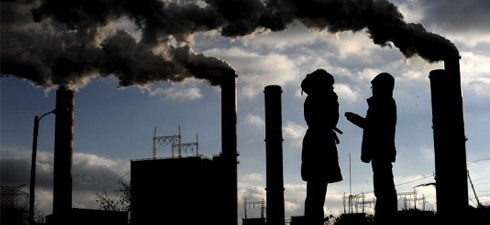Poland’s veto against the post-2020 greenhouse gas emissions curbing directive proposed at the EU summit in Brussels last Friday was right. But the way we explain our position in Europe has been lamentable.
There is not a shred of trust between Polish officials and climate commissioner Connie Hedegaard. But that’s not the real problem – commissioners come and go and in Brussels the unofficial talk is that there will be no climate commissioner in the next Commission at all. The worst thing is the mutual suspicion-poisoned atmosphere has started to filter through to Poland’s relations with some of its key EU partners – Germany, Sweden and Denmark.
What EU partners and ecological organisations are refusing to acknowledge is that Poland has made a huge effort to curb carbon dioxide emissions, cutting them from 453 million tons in 1990 to 377 million in 2009. We would easily meet the EU goal of curbing emissions by 20 percent from 1990 levels by 2020. And that without the European emissions trading system, which resembles the institution of medieval indulgences, and without costly subsidies for wind energy.
We would do that by improving energy efficiency and replacing our communist-era power plants with more modern ones, though also fuelled with coal. However, no serious Polish politician will ever say that the instruments of the EU climate policy are inefficient and poorly constructed – because that’s taboo.
On the other side things are no better. It is quite clear that the EU strategy is to eliminate coal as the heaviest carbon dioxide emitter. Coal energy is to be costlier than gas and even wind energy – that’s the meaning of the climate policy.
17th-century mercantilism and hypocrisy
But no Western politician will ever openly admit as much, so instead we are fed platitudes about “pure coal” technologies, such as storing CO2 underground. Well, they will never be implemented, because it does not make economic sense – it costs much less to build gas or nuclear power plants. On this score, the hypocrisy of the EU officials and politicians is truly irritating.
In this situation, Polish politicians and officials – by no means conspiracy theory lovers – are suspecting that climate change is simply becoming a convenient means of promoting technologies in which several countries have become greatly specialised. Putting it more simply, Danish or German wind generators need new markets, because in the West they are already feeling the squeeze.
Are these suspicions justified? That I do not know. I think it is rather an example of an interlock similar to that described in Max Weber’s classic work, The Protestant Ethic and the Spirit of Capitalism. The new religion was better at reconciling the merchants’ and industrialists’ spiritual and material needs. Today, fighting global warming is something where you can have both ideals and interests. It’s easier to offload the cost of wind-power subsidies onto consumers when they believe it means doing something good for the Earth. And that the German Siemens or Danish Vestas are making a fortune in the process...
Besides ecological arguments, the main line on which the EU is selling its climate policy is becoming independent from fossil fuels – oil, gas or col – extracted in politically unstable countries or ugly dictatorships. Putting aside the fact that this smells of 17th-century mercantilism and hypocrisy (China imports somehow don’t bother anyone too much), the argument is also completely off-the-mark in Poland’s case.
Sound arguments
Greenpeace, one of the most influential organisations in favour of the climate change policy, said in a communiqué after the Polish veto that it would increase the EU’s dependence on fossil fuels. “The EU is paying a billion dollars a day for this,” claims the organisation.
Greenpeace is refusing to understand that Poland’s situation is exactly the opposite. The climate policy forces countries to replace coal with gas and nuclear power – which for Poland means greater dependence on Russian gas, because Poland’s own shale gas resources remain uncertain.
Why should Poland make a sacrifice for the rest of the EU and give up its coal when EU treaties provide that member states are independent in shaping their energy balance? It seems that the times when we dreamt of being a Winkelried among the nations are no longer.
The budget commissioner, Poland’s Janusz Lewandowski, some time ago called the global warming theory into question, for which he was lambasted in the West. And probably rightly, because politicians and commentators shouldn’t dispute climate scientists.
But talking of the economic consequences of “climate” decisions is a different matter altogether. Here the Polish government has sound arguments and has to try to get them through to the Western public opinion. Unfortunately, it is not even trying...
A conversation with investigative reporters Stefano Valentino and Giorgio Michalopoulos, who have dissected the dark underbelly of green finance for Voxeurop and won several awards for their work.
Go to the event >










